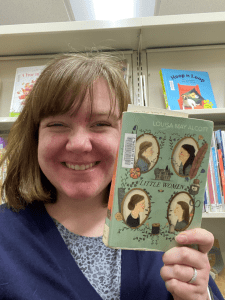Little Women – Online Book Club
March is Women’s History Month, and we’re excited to bring you a host of interesting, fun, and educational books, programs, and resources all month long! Your librarians will be highlighting amazing women authors, women in business, and more. Among these programs is the Online Book Club (we refer to it as ‘OBC’) hosted by Cedarville Adult Services Librarian Erin K.
They discuss a new book each month beginning with a blog post every Monday. Erin fuels great discussions with insights and food for thought for each week. Book club members engage an open forum for a fun book discussion! I was excited to learn some of Erin’s favorite aspects of her book club.
---
How has moving you club online changed your experience of what book clubs can be?
I love the fact that we can be completely self-paced. Readers can check out the blog posts whenever they like, and they can comment whenever works best for them. I really enjoy the fact that readers can continually access all the book club information and aren’t just limited to one meeting.
What do you think are the best parts for book club members?
I hope the best parts of the book club for members are the blog posts. I truly enjoy finding video clips, interviews, and websites to add to the blog posts, and I hope readers enjoy all those “extras.” I also think readers enjoy the relaxed nature of it since there’s no pressure to finish or comment on a particular date.
---
 For Women’s History Month, Erin chose Little Women. I had the opportunity to chat with Erin about the significance of Little Women on women’s history.
For Women’s History Month, Erin chose Little Women. I had the opportunity to chat with Erin about the significance of Little Women on women’s history.
Originally published in 1868, Little Women by Louisa May Alcott follows the trials and tribulations of the March sisters throughout their childhood into adulthood. The March family unit is strong, but each sister’s individuality shines through – Jo yearns to be a published writer; Meg is a wonderful actress; Amy wishes to master painting; and Beth is musically inclined. When discussing what makes this story so pertinent to women’s history, Erin remarks “Each one of the female characters is distinct and independent while also staying true to the time in which they lived. I think this book is important to women’s history because it shows that women were full, complete people with dreams and passions.”
Erin goes on to discuss that depicting women as “people with dreams and passions” was groundbreaking at the time of publication due to societal norms. “[Women] weren’t always able to implement those passions due to social restraints,” said Erin. It was common for men to have numerous aspirations, but for women, not so much, since they were typically bound to their societal duty of becoming wives and mothers. The book’s author Louisa May Alcott herself was revolutionary; she was a notable woman author among the male-dominated literary world at the time. Alcott also never married, never had children and was an early American suffragette. Consistently going against societal norms, Alcott was a life-long advocate for herself and women alike.
Little Women’s popularity and significance persists today. With numerous film/television adaptations, readers and watchers alike can enjoy this timeless tale. At its core, this story is about women and family from a woman’s perception; readers relate to the March sisters and the familial story line, allowing the story to resonate today. “This [March] family, while enduring hardships and heartache, are close-knit and loving, and the family relationship feels very reassuring. And the fact that each girl is so different makes the book everlasting,” Erin says.
Just for fun, Erin and I joked that everyone identifies with at least one of the March sisters. Buzzfeed has an abundance of March sisters personality quizzes, especially after Greta Gerwig’s most recent film adaptation of the story in 2020, which Erin says is her favorite version. “When I was younger, I would have said that I identified with Jo because I wanted to be a writer, and I loved how creative she was. As an adult, I think I still identify as Jo, less because of her creativity and much more because she loves her family deeply and desperately wants to keep them close,” Erin says.
Join Erin’s online book club and look for weekly blog posts every Monday at greenelibrary.info/blogs!




Add a comment to: Historical, Headstrong, and Humorous: Discover the Marvelous March Sisters